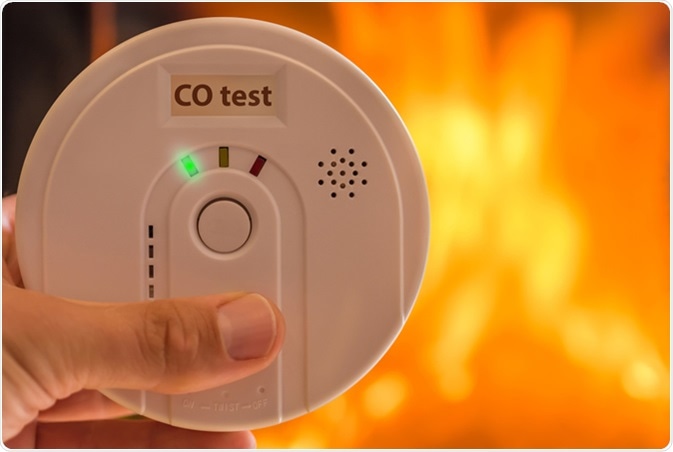Carbon monoxide (CO) is a poisonous, colorless, and odorless gas. It may cause sudden illness and possibly death if the patient who inhaled it does not receive immediate medical attention.

Image Credit: Ralf Geithe / Shutterstock
Carbon Monoxide Poisoning Overview
CO poisoning is a deadly condition wherein the patient has inhaled volumes of smoke or gas containing CO. It is a tasteless gas that prevents the red blood cells from carrying oxygen to the different tissues and cells in the body.
It can rapidly turn fatal if immediate medical attention is not provided. The rates of CO poisoning have increased over the years because it has no taste or smell. As a result, people exposed to the poisonous gas aren’t aware that they are affected. Sometimes, these patients may blame other diseases for their symptoms.
According to the Center for Disease Control and Prevention (CDC) and other global organizations, a high number of deaths occurred as a result of CO poisoning globally during the last decade.
The Quiet Killer
Causes of Carbon Monoxide Poisoning
Unsafe gas appliances can produce high volumes of CO. It may be produced by the incomplete burning of liquefied petroleum gas (LPG) or natural gas. Also, oil and solid fuels like petrol, wood, and coal may produce CO gas.
The other major sources of increased CO production include wood stoves, fireplaces, wood, charcoal or gas barbeques, and chemical heaters. CO may release from gas or kerosene heaters or cookers, vehicles, cigarette smoke, and diesel.
CO can harm the body. Normally, the body uses oxygen from the air. The body transports oxygen through the red blood cells containing hemoglobin. Hemoglobin is vital as it takes up oxygen as it enters the lungs. In turn, carbon dioxide (CO2) is released from the blood into the exhaled breath.
However, when CO is inhaled into the lungs, it binds to hemoglobin. Also, CO attaches itself to hemoglobin 240 times tighter compared to oxygen. This forms carboxyhemoglobin. Eventually, there will be lesser hemoglobin available to bind to oxygen.
As a result, different vital organs and tissues in the body are starved of oxygen.
Signs and Symptoms of Carbon Monoxide Poisoning
CO may attack quickly. Large amounts of CO in the body may produce serious complications without warning. The most common symptoms associated with CO poisoning include dizziness, headache, nausea, vomiting, weakness, altered mental status, and chest pain.
Severe poisoning symptoms include difficulty in breathing, irritability, loss of consciousness, and other neurologic symptoms. If it is not treated immediately, it may lead to coma and even death.
Carbon Monoxide Poisoning First Aid
If you suspect CO poisoning, let the patient get fresh air immediately. You can open the doors or windows, turn off any gas appliances, or leave the premises.
If you have identified the CO gas source, turn it off. However, make sure you are not exposed to the gas. Make sure the scene is safe for you and the patient.
Immediately call emergency medical services for assistance. Also, call the local poison control helpline for assistance. Support the patient in a comfortable position. Encourage him or her to breathe normally.
If an oxygen tank or source is available at the scene, administer 100-percent oxygen to the patient via a face mask.
Stay with the patient and reassure him or her while waiting for emergency personnel to arrive. Always monitor the patient by observing his or her breathing, response, and pulse.
If the patient becomes unresponsive, check for breathing, and open the airway. If the patient has stopped breathing, perform cardiopulmonary resuscitation (CPR) immediately.
Do not give anything orally. Also, do not give any medication to the patient.
The prognosis of CO poisoning depends on the duration of exposure, the time between the exposure and the administration of treatment, and the severity of the symptoms. If the poisoning is mild and the duration of exposure is short, the patient may recover completely.
On the other hand, prolonged exposure and severe poisoning may result in death. Severe CO poisoning may require putting the patient in a full-body and high-pressure chamber, wherein the machine forces oxygen into the body. For mild poisoning, the administration of oxygen may be enough to curb the condition.
CO is a poisonous and killer gas. Remember the possible causes and signs of the condition for appropriate and immediate medical attention to be given to an affected individual.
Further Reading
Last Updated: Oct 11, 2022